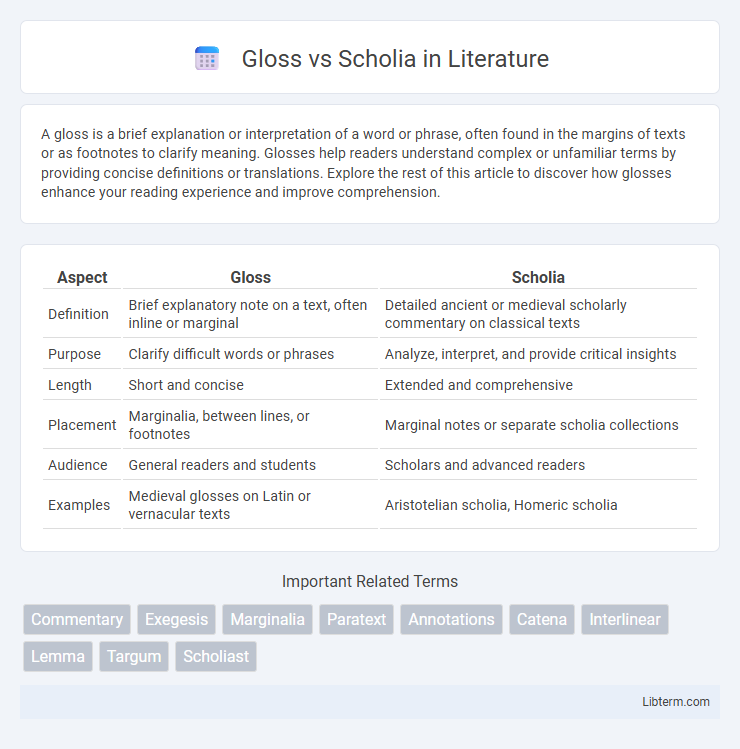A gloss is a brief explanation or interpretation of a word or phrase, often found in the margins of texts or as footnotes to clarify meaning. Glosses help readers understand complex or unfamiliar terms by providing concise definitions or translations. Explore the rest of this article to discover how glosses enhance your reading experience and improve comprehension.
Table of Comparison
| Aspect | Gloss | Scholia |
|---|---|---|
| Definition | Brief explanatory note on a text, often inline or marginal | Detailed ancient or medieval scholarly commentary on classical texts |
| Purpose | Clarify difficult words or phrases | Analyze, interpret, and provide critical insights |
| Length | Short and concise | Extended and comprehensive |
| Placement | Marginalia, between lines, or footnotes | Marginal notes or separate scholia collections |
| Audience | General readers and students | Scholars and advanced readers |
| Examples | Medieval glosses on Latin or vernacular texts | Aristotelian scholia, Homeric scholia |
Introduction to Gloss and Scholia
Gloss refers to explanatory notes or comments added to a text, often written in the margins or between lines to aid reader comprehension of difficult words or passages. Scholia are ancient or medieval marginal annotations that provide critical commentary, interpretations, or scholarly explanations tied to specific parts of a text. Both glosses and scholia serve as important tools for understanding historical manuscripts and classical literature by offering contextual insights and clarifications.
Historical Origins of Gloss and Scholia
Glosses and scholia both emerged in antiquity as tools for textual interpretation, with glosses originating in the early medieval period as marginal notes explaining difficult words or phrases in manuscripts. Scholarly annotations known as scholia date back to ancient Greece and Rome, serving as comprehensive commentaries that provided critical insights into classical texts. These traditions reflect evolving practices in preserving and elucidating literary works, with glosses emphasizing linguistic clarification and scholia offering broader scholarly analysis.
Definitions: What is a Gloss?
A gloss is an explanatory note or translation inserted into a text to clarify the meaning of difficult words or phrases, often appearing in the margins or between the lines. It serves as a linguistic or interpretative aid, providing historical or contextual insight into the original content. Glosses are essential in medieval manuscripts and ancient texts for understanding language evolution and cultural references.
Definitions: What is a Scholia?
A scholium is an ancient marginal note or explanatory comment written by classical scholars to clarify or interpret classical texts, often providing historical context, linguistic analysis, or literary criticism. Unlike a gloss, which typically offers a brief definition or translation of a specific word or phrase, a scholium can be longer and more detailed, addressing broader textual issues or scholarly insights. These annotations are valuable in classical studies, preserving interpretative traditions and enhancing understanding of historical manuscripts.
Purposes and Functions of Glosses
Glosses serve as explanatory notes that clarify difficult or obscure words and passages, enhancing comprehension of primary texts. They function as marginal or interlinear annotations that provide linguistic, historical, or contextual insights crucial for readers and scholars. Unlike scholia, which often interpret or critique the text, glosses primarily aim to elucidate language and meaning to facilitate better understanding.
Purposes and Functions of Scholia
Scholia serve as critical explanatory annotations that clarify and interpret ancient texts, offering background information, linguistic insights, and contextual commentary to enhance comprehension. Their primary function is to bridge gaps in understanding by elucidating obscure references, historical allusions, and textual variants, thereby aiding scholars in accurate textual analysis. Unlike glosses, which typically provide brief definitions for specific words, scholia present more extensive scholarly discourse, often embedding philological, historical, and literary interpretations.
Comparative Analysis: Gloss vs Scholia
Gloss and scholia both serve as explanatory notes on classical texts, but glosses typically offer brief, concise definitions or translations of difficult words and phrases directly alongside the text. Scholia provide more extensive commentary, including interpretations, historical context, and textual criticism, often written by ancient or medieval scholars. The comparative analysis reveals glosses prioritize immediate lexical clarity, while scholia contribute deeper scholarly insights, enhancing comprehensive understanding of the original work.
Impact on Textual Interpretation and Scholarship
Glosses provide concise explanatory notes directly adjacent to the original text, offering immediate clarification that aids in preserving authorial intent and enhancing reader comprehension. Scholia, often more extensive and analytical, supply historical context, interpretive commentary, and variant readings, which enrich critical scholarship and enable multifaceted textual analysis. Together, gloss and scholia significantly influence textual interpretation by balancing straightforward understanding with deeper scholarly insight, shaping the development of philology and classical studies.
Modern Applications of Gloss and Scholia
Glosses and scholia serve distinct roles in modern textual analysis, with glosses providing concise linguistic or definitional notes directly linked to specific words or phrases in digital humanities projects. Scholia offer expanded interpretative commentary and contextual information, often integrated into academic platforms like Wikisource or digital editions of classical texts. Contemporary applications leverage glosses for immediate language clarification while employing scholia to enrich understanding through comprehensive historical or literary insights.
Conclusion: Relevance of Gloss and Scholia Today
Gloss and scholia remain vital tools in modern classical and medieval studies, providing essential context and interpretation for primary texts. Glosses offer concise explanations of difficult words or phrases, enhancing language comprehension, while scholia provide broader commentary on historical, literary, and philosophical aspects, enriching scholarly analysis. Both forms continue to support textual criticism and educational endeavors by bridging ancient knowledge with contemporary research.
Gloss Infographic

 libterm.com
libterm.com